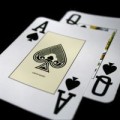The origin of Blackjack is somewhat unclear. Some people believe that Blackjack originated in French casinos in the early 1700s where it was known as "vingt-et-un" ("20 and 1"). The game became known as Blackjack because if a player held a Jack of Spades and an Ace of Spades as the 1st two cards, the player was paid out extra. So with a Jack being a vital card and Spades being black, the game was called Blackjack.
This game has been played in the United States since the 1800's. However, between the 1850's and 1910, gambling was legal in the United States until Nevada made it a felony to gamble. In 1931, Casino gambling was re-legalized in Nevada where Blackjack became one of the main games offered to gamblers.
The objective of Blackjack is get as close to 21 points as possible without going over 21 (which is bust). While numbered cards are worth their face values, face cards (Jack, Queen and King cards) are worth 10 each and the Ace card can be worth either 1 or 11.
The person (player or dealer) whose total card value reaches as close to 21 as possible without exceeding 21 (bust) wins the game. A tie (push) results if both the player and the dealer get equal card values.
The game is played in the following steps: 1. The player places a bet.
2. The dealer deals two cards (usually facing upwards) to the player and one card to himself/herself.
3. The dealer draws a second card for himself/herself and places it face down.
4. The player is then asked if he/she wants another card (hit) or if he/she wishes to stand.
5. The player may request as many hits as he/she would like until the total value of his/her card reaches 21 or he/she busts.
6. If the player busts, the house (casino) will win.
7. If the player stops at a total card value that is as close to 21 without going bust, then the dealer will reveal the value of his/her second card.
8. If the value of the dealer's second card gives him a Blackjack (total value of 21), then the house (casino) will win. The dealer must keep drawing cards until the total value of his/her cards is 17 or more. If the dealer goes over 21, then the player will win.
Whoever comes as close to 21 points as possible without going over 21 (bust) is the winner.
Blackjack is just as popular today as it was back in the 1800's. It is by far the most played table game in a casino. This is mainly due to the fact that it is very easy to learn and play.

